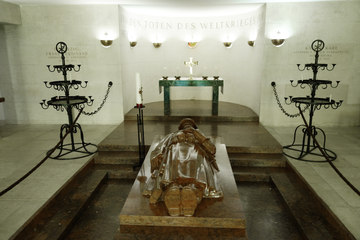The First World War as a ‘Site of Memory’
As a ‘site of memory’ the First World War was overlaid by the remembrance of the Second World War and the Holocaust in Austria, and in Germany too. In the cycle of years of celebration and remembrance the ‘8’ years (1918, 1938) always received more attention than the ‘lesser’ ‘4’ years (1914, 1934). In Austria’s historical memory the year 1918 marked less the end of the First World war than the end of the Monarchy, and this led to interminable discussions about the identity of the former world power which had become a small state as a result of the post-war treaties signed in the suburbs of Paris.
The beginning of the First Republic was overshadowed by the narrative of the state ‘which nobody wanted’, by the conflicts between the political camps, by misery and suffering and by an ‘inter-war period’ which led directly into the Second World War. As far as the First World War was concerned it was the shots fired in Sarajevo that remained in the memory more than everything else that followed. The question of war guilt played a subordinate role in the historiographical discourse in Austria. This was different from the situation in Germany, where Fritz Fischer’s book Griff nach der Weltmacht (The Bid for World Power), which apportioned war guilt unequivocally to Germany, triggered a heated debate among historians when it was published in 1961 which became known as the Fischer Controversy.
The dogma of seeing 1945 and 1955 as a new beginning and the Second Republic as a positive contrast to the First Republic led to the First World War no longer being in the focus of observation by historians and the media. This underexposure has shifted significantly in connection with the one hundredth anniversary of the outbreak of the war. In the year 2014 it seems that there is no medium which has not got a focus on the First World War in its programme. In Germany the issue of war guilt has flared up again, triggered by The Sleepwalkers by the Australian historian Christopher Clark, which has become a bestseller. In his book Clark ascribes (a share of the) responsibility for the First World War to Germany, but no more so than to all the other powers involved. This has mostly met with agreement and a favourable reception in Germany, while in Austria reaction has been comparatively muted.
As the historian Heidemarie Uhl has noted, memory means giving ‘an event sense and meaning from the perspective of the present’. Uhl detects two aspects which could make the First World War still relevant as a site of memory for the present time: the first is remembrance of those who were killed – this is linked to the image of the ordinary soldier, who has been stylized as a hero for having fought and died in the First World War. As this way of remembering heroes was also transferred to those who fell in the Second World War, this image of ‘ordinary soldier’ has repeatedly come in for severe criticism in connection with the role of soldiers in the German army and the crimes they committed. Uhl sees the second aspect in the founding date of the First Republic, which opens up ‘the possibility of new perspectives which go beyond forms of interpretation which are politically charged. The prerequisite for this is the reconstruction of the debates and controversies surrounding the years 1914 to 1918, which should in particular include the field of historical scholarship’. At a transnational level, programmes of common remembrance, especially in Central Europe and with the successor states of the Austro-Hungarian Monarchy, would provide a chance to develop a way of looking at the First World War from new perspectives.
Translation: Leigh Bailey
Historische Pflichterfüllung – Ein Interview mit Gerd Krumeich. Unter: http://grandeguerre.hypotheses.org/1433 (10.06.2014)
Korte, Barbara (Hrsg.): Der erste Weltkrieg in der populären Erinnerungskultur, Essen 2008
Krumeich, Gerd: „Konjunkturen der Weltkriegserinnerung“, in: Rother, Rainer: Der Weltkrieg 1914–1918, Berlin 2004, 68–73
Riesenfellner, Stefan (Hrsg.): Steinernes Bewußtsein I. Die öffentliche Repräsentation staatlicher und nationaler Identität Österreichs in seinen Denkmälern, Wien/Köln/Weimar 1998
Uhl, Heidemarie: Der Erste Weltkrieg im Gedächtnis Österreichs und (Zentral)Europas – Gedächtnistraditionen in (trans)nationaler Perspektive, in: Christa Hämmerle et al.: Grundlagenpapier österreichischer Wissenschaftlerinnen und Wissenschaftler aus Anlass des Gedenkens des Ausbruchs des Ersten Weltkriegs vor 100 Jahren, Wien 2013, 30-32. Unter: http://www.bmeia.gv.at/fileadmin/user_upload/bmeia/media/3-Kulturpolitische_Sektion_-_pdf/Themen_Dateien/Grundlagenpapier_1914_-_2014.pdf (20.06.2014)
Ullrich, Volker: Zündschnur und Pulverfass, in: Die Zeit vom 17.9.2013. Unter: http://www.zeit.de/2013/38/sachbuch-christopher-clark-die-schlafwandler-europa-erster-weltkrieg (06.06.2014)
Quotes:
„the possibility of new perspectives ...“: Uhl, Heidemarie: Der Erste Weltkrieg im Gedächtnis Österreichs und (Zentral)Europas – Gedächtnistraditionen in (trans)nationaler Perspektive, in: Christa Hämmerle et al.: Grundlagenpapier österreichischer Wissenschaftlerinnen und Wissenschaftler aus Anlass des Gedenkens des Ausbruchs des Ersten Weltkriegs vor 100 Jahren, Wien 2013, 30-32, hier: 31. Unter: http://www.bmeia.gv.at/fileadmin/user_upload/bmeia/media/3-Kulturpolitis... (20.06.2014) (Translation)
-
Chapters
- The First World War as a ‘Site of Memory’
- The First World as the ‘Original Catastrophe’ – Narrative I
- From ‘Powder Barrel’ to ‘Universal Conflagration’ – Narrative II
- ‘Laurels for the Soldiers Who are Worthy of Laurels’ – the Outer Burgtor Becomes a Monument to Heroes
- The ‘Siegfried’s Head’ at the University of Vienna
- The ‘Ordinary’ Soldier Becomes a Hero
- Remembrance Tourism: Travel to the Sites of War




